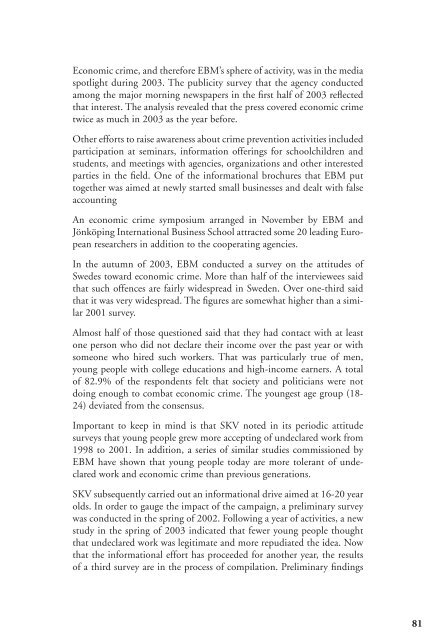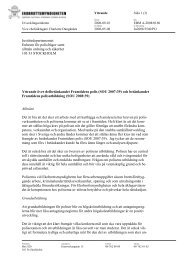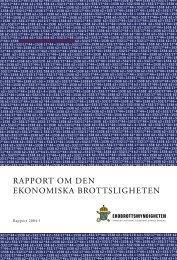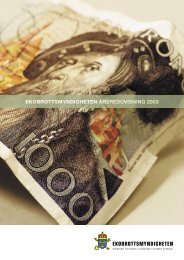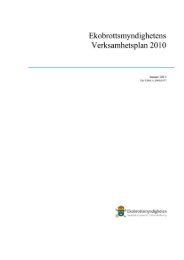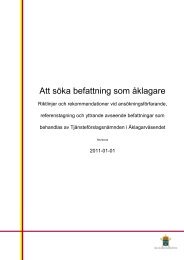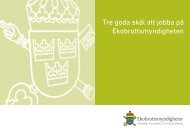Economic crime report 2004 - Ekobrottsmyndigheten
Economic crime report 2004 - Ekobrottsmyndigheten
Economic crime report 2004 - Ekobrottsmyndigheten
You also want an ePaper? Increase the reach of your titles
YUMPU automatically turns print PDFs into web optimized ePapers that Google loves.
<strong>Economic</strong> <strong>crime</strong>, and therefore EBM’s sphere of activity, was in the media<br />
spotlight during 2003. The publicity survey that the agency conducted<br />
among the major morning newspapers in the first half of 2003 reflected<br />
that interest. The analysis revealed that the press covered economic <strong>crime</strong><br />
twice as much in 2003 as the year before.<br />
Other efforts to raise awareness about <strong>crime</strong> prevention activities included<br />
participation at seminars, information offerings for schoolchildren and<br />
students, and meetings with agencies, organizations and other interested<br />
parties in the field. One of the informational brochures that EBM put<br />
together was aimed at newly started small businesses and dealt with false<br />
accounting<br />
An economic <strong>crime</strong> symposium arranged in November by EBM and<br />
Jönköping International Business School attracted some 20 leading European<br />
researchers in addition to the cooperating agencies.<br />
In the autumn of 2003, EBM conducted a survey on the attitudes of<br />
Swedes toward economic <strong>crime</strong>. More than half of the interviewees said<br />
that such offences are fairly widespread in Sweden. Over one-third said<br />
that it was very widespread. The figures are somewhat higher than a similar<br />
2001 survey.<br />
Almost half of those questioned said that they had contact with at least<br />
one person who did not declare their income over the past year or with<br />
someone who hired such workers. That was particularly true of men,<br />
young people with college educations and high-income earners. A total<br />
of 82.9% of the respondents felt that society and politicians were not<br />
doing enough to combat economic <strong>crime</strong>. The youngest age group (18-<br />
24) deviated from the consensus.<br />
Important to keep in mind is that SKV noted in its periodic attitude<br />
surveys that young people grew more accepting of undeclared work from<br />
1998 to 2001. In addition, a series of similar studies commissioned by<br />
EBM have shown that young people today are more tolerant of undeclared<br />
work and economic <strong>crime</strong> than previous generations.<br />
SKV subsequently carried out an informational drive aimed at 16-20 year<br />
olds. In order to gauge the impact of the campaign, a preliminary survey<br />
was conducted in the spring of 2002. Following a year of activities, a new<br />
study in the spring of 2003 indicated that fewer young people thought<br />
that undeclared work was legitimate and more repudiated the idea. Now<br />
that the informational effort has proceeded for another year, the results<br />
of a third survey are in the process of compilation. Preliminary findings<br />
81


